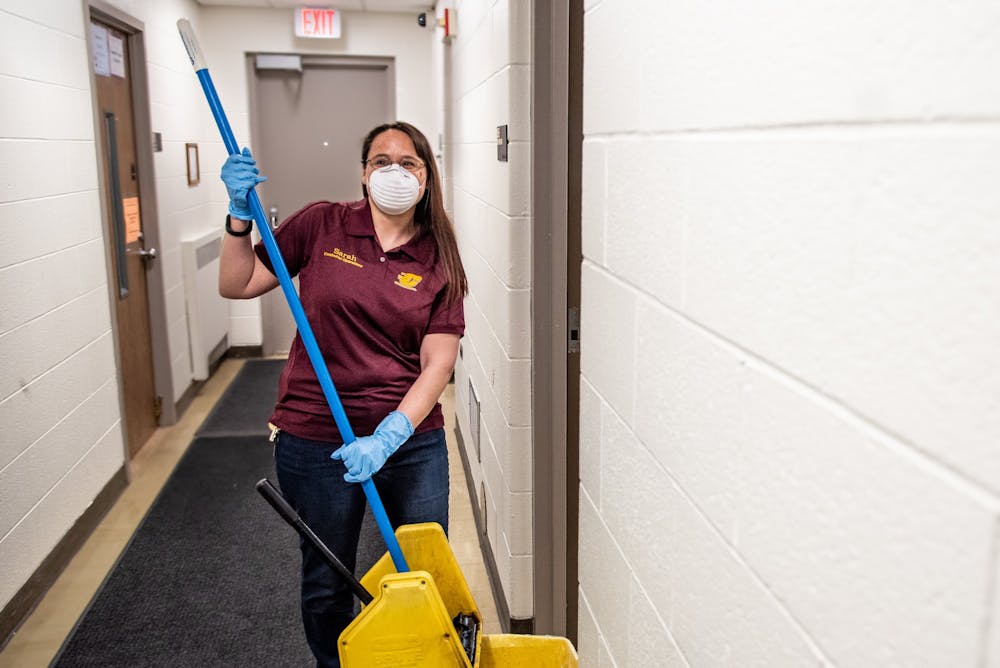Facilities management staff adapt to challenges while keeping campus clean
Custodian Sarah DeLong exits a classroom outside Bush Theater on Central Michigan University's campus.
The hallways of Moore Hall would be empty if it were not for the tables, desks and chairs stripped from classrooms and offices lining the walls.
DeLong will spend almost two months emptying classrooms before waxing floors, cleaning walls and wiping down furniture.
For DeLong, the job of keeping campus virus-free is personal.
"When people come into my building, I want them to know it is safe," DeLong said. "I have a college-aged student of my own, and I want her to know there's people looking out for her."
Due to the threat of coronavirus, the CMU facilities management staff has remained essential to campus. Their work keeps 6 million feet of facility space on campus clean and safe. However, like other "deemed-essential" jobs, their duties and protocol change on a day-to-day basis.
Jonathan Webb, associate vice president of facilities management, said the biggest changes come from the CDC guidelines regarding sanitation.
Fortunately, sanitation plans were already in place before confirmed cases reached Michigan.
Director of Facilities Operations Jay Kahn started pulling janitorial teams together in February when the university began organizing its first COVID-19 advisory teams. He reemphasized training and wrote customized custodial plans for employees based on the areas they cleaned.
Custodian Kellie Carlson is stationed on the third floor of Moore Hall where she's in charge of cleaning 38 offices, 7 classrooms and staircases on either end of the building. Carlson said its all about attention to detail right now.
"COVID-19 only elevates the need for precision, especially on campus where there are a lot of old buildings that make it harder to do this job," she said. "The only thing that matters is keeping those buildings clean."
With some students choosing to remain on campus, facilities management shifted their attention to high traffic areas in residence halls.
“Wherever (students) are, we have a custodian wiping down major touch-points multiple times a day,” Kahn said. “We’ve been emphasizing that since February.”
Custodial staff are also positioned in open buildings like Foust Hall, Warriner Hall and the CMU Police Station.
Webb said the buildings off-limits to students, such as the library and Wightman Hall, are still getting custodial attention.
“Wightman may be locked, but the 3D printers are in there, so there’s a significant amount of people going in and out,” Webb said. “Custodians are there as well."
The extra work has many challenges, Kahn said. Schedules are being modified to fit the hours when students are most active. Also, more work doesn't mean more help.
“Usually working ‘til 8 o’clock was overtime, but we’re making sure students are safe," Kahn said. “That’s why custodial work is considered an essential service.”
The custodial staff move through the workday differently. They don't enter their break rooms. They clock in digitally from anywhere on campus. They keep connected with supervisors by phone or text. All this to uphold social distancing.
“Some of the students, like the international students, don’t have a home to go back to right now,” Kahn said. “So if you have to be stuck here, let us make it as safe as possible.”
As of April 25, "move-out day" for all residence halls is May 1-9. Kahn and his staff are turning to the CDC for recommendations. After students have moved out, the rooms will be left for a week before a routine summer cleaning by residence life and the custodial staff.
The summer is used as an optimal time for sprucing up campus. Rooms are repainted and trees are planted, welcoming students back for another year.
Webb said even though facilities management staff have their hours cut in half, the university is open to the public. Therefore a safe, walkable and decent-looking campus is still a priority.
Kahn asks students to continue social distancing for their own safety and the safety of their staff.




